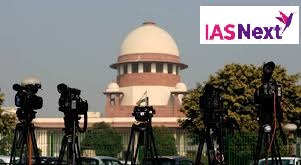CURRENT AFFAIRS
Get the most updated and recent current affair content on Padhaikaro.com
Fundamental duties must be enforced
- IAS NEXT, Lucknow
- 02, Mar 2022

says plea in Supreme Court:
Reference news:-
A petition has been filed in the Supreme Court seeking the enforcement of Fundamental Duties under the Indian constitution through comprehensive and well-defined laws.
- The court has asked the centre and states to respond on this matter.
Need for:
The need to enforce fundamental duties arises due to a new illegal trend of protest by protestors in the garb of freedom of speech and expression, by way of blocking of road and rail routes in order to compel the government to meet their demands.
- This is also necessary to remind citizens that fundamental duties were as important as fundamental rights under the Constitution.
Supreme Court’s judgment in the Ranganath Mishra case: The Court observed that fundamental duties should not only be enforced by legal sanctions but also by social sanctions. After all, rights and duties were co-relative.
Rationale behind the demand:
- The petition referred to the Bhagwad Gita on the importance of duty. Lord Krishna guides Arjuna and educates him with the importance of duties in all spheres/ stages of one’s life.
- It also referred to the erstwhile Soviet Constitution where the rights and duties were placed in the same footing.
- Fundamental duties instill a “profound sense of social responsibility towards the nation”. Hence, they have to be enforced.
Impacts:
- Enforcement of Fundamental Duties upholds and protects sovereignty, unity and integrity of India.
- It also prepares citizens to defend the country and render national service when called upon to do so.
- It seeks to disseminate a sense of nationalism and to promote the spirit of patriotism to uphold the unity of India after the emergence of China as a superpower.
Fundamental Duties:
Original constitution did not contain any provisions related to Fundamental Duties (FD).
- This section was added through 42nd amendment act to the constitution of India based on the recommendations of Swaran Singh Committee. In 2002, another Fundamental duty was added to this list.
- The idea of this section was borrowed from USSR constitution.
- Japanese constitution is one of the other democratic nations which have a provision dealing with the duties of its citizens.
- Fundamental duties like DPSP are non-justiciable.
Significance of FD:
- They serve as a reminder to the citizens that while enjoying their rights, they should also be conscious of duties they owe to their country, their society and to their fellow citizens.
- They serve as a warning against the anti-national and antisocial activities like burning the national flag, destroying public property and so on.
- They serve as a source of inspiration for the citizens and promote a sense of discipline and commitment among them.
- They create a feeling that the citizens are no mere spectators but active participants in the realization of national goals.
Criticism of FD:
- They are made non-justiciable in nature.
- Important duties such tax-paying, family planning etc. are not covered.
- Vague and ambiguous provisions which are difficult to be understood by a common man.
- Superfluous provisions since they would generally be followed even if they were not included.
- Inclusion as an appendage to the constitution reduces the value and intent behind FD.